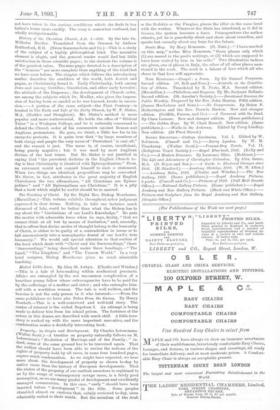History of the Christian Church, A.D. 1-600. By the late
Dr. Wilhelm Moeller. Translated from the German by Andrew Rutherford, B.D. (Swan Sonnenschein and Co.)—This is a study of the subject of a highly philosophical kind. The narrative element is slight, and the general reader would find but little satisfaction in these scientific pages ; to the student the volume is of the greatest value. The nine pages devoted to a description of the " Sources" are more complete than anything of the kind that we have seen before. The chapter which follows the introductory matter describes the condition of the world, both Jewish and pagan, as Christianity found it. Early Christianity, both among Jews and among Gentiles ; Gnosticism, and other early heresies ; the attitude of the Emperors ; the development of Church order, are among the subjects which Dr. Moeller, who gives the impres- sion of having been as candid as he was learned, treats in succes- eion.—A portion of the same subject—the First Century—is treated in The Faith and Life of the Early Church, by W. F. Slater, M.A. (Hodder and Stoughton). Mr. Slater's method is more popular and more controversial. He holds the office of "Biblical Tutor" in a Wesleyan College, and be is naturally concerned to defend the Church order of his communion against Roman and Anglican pretensions. He goes, we think, a little too far in his energetic protests. It is quite true that 'by large numbers of both clergy and people the very name of 'Protestant' is cast off," and the remark is just. The name is, of course, insufficient, being purely negative ; but it was used by most Anglican divines of the best times. But Mr. Slater is not justified in saying that "the prevalent doctrine in the English Church to- day is that Christianity is identical with Episcopalianism." Even, an extremist would not commit himself to such a statement. When two things are identical, propositions may bo converted Mr. Slater, in fact, attributes to the great majority of English Churchmen the two affirmations, "All Christians are Episco- palians" and "All Episcopalians are Christians." It is a pity that a book which might be useful should be so marred.






































 Previous page
Previous page